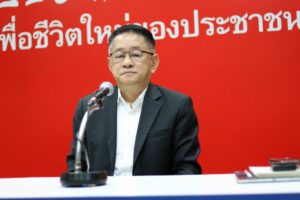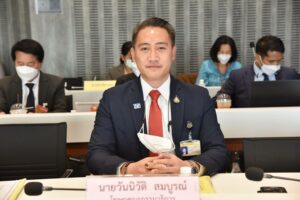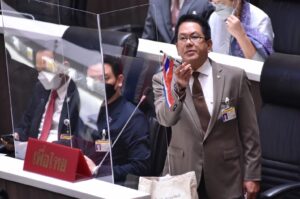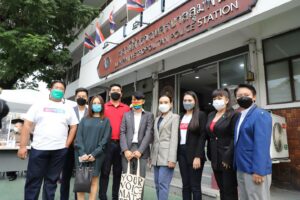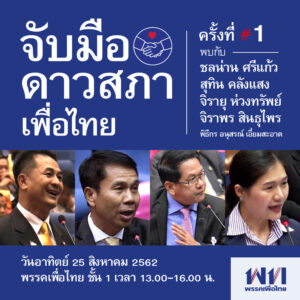The Principles and Guidelines for Reconciliation
1. Success
Factors for the Reconciliation
Most
people want the society they live in to progress in an enduring and peaceful
manner in which fairness and respect for human dignity is accepted as a basic
right of the individuals. Nevertheless,
there will always be conflicts that arise from nationality, creed, colour, beliefs,
economic differences, etc., within all societies.
Any society that upholds the right principles
will progress peacefully even though it may be in the midst of conflicts of
differences, which is part of human nature.
However, without the right guiding principles, violence, hatred,
defamation, injustice, etc. will occur which will result in the emotional and physical
instability of that society.
Within the last 10 years, The Thai society went
through a very unstable period. The
non-acceptance of the democratic process; the people divided into groups represented by
the different colours; non-acceptance of
the judicial process by some groups of people, etc., led to two power seizures
within a period of 7 years in which a number of people were injured or lost
their lives. This was unprecedented
since 1932 when Thailand changed its system of government and the people are
still fearful that, even with new elections, the conflict and violence that may
seem to have died down temporarily may escalate once again.
Therefore,
the Thai society is very much in need of reconciliation so that it can break
away from the entrapments of these conflicts.
The reconciliation must be for the benefit of all and not for some
individuals or certain groups of people.
Whether or not this will be possible will depend on 3 factors:
Firstly, the government, the NCPO and all those who are involved in
this process must be sincere.
Secondly, those involved must have the right
understanding and knowledge of the meaning of reconciliation and its process. They must be neutral and independent from influences
and orders from any parties.
Lastly, there should be no
prejudice by those who are in power, be it the government, the NCPO, the
legislative bodies, the courts, the independent or government agencies. If civil officials have prejudice and are not
neutral in solving the problem, the reconciliation can never happen because the
people will not trust the state mechanisms.
2.
What kind of environment favours
reconciliation and peace in the society?
Almost all countries, including Thailand, believe in
the “sovereignty of the people”.
Since the country’s change in the government system, every coup d’état
councils, having seized power and an”ed the constitution that gave rights to
hold elections and drew up new constitution with no elections but with only the
parliament to appoint the government that comes from the coup, even they have
all upheld the principle of “the
sovereignty of the Thai people.” No
constitution has ever decreed that the sovereignty belongs to any
individuals. It is clear, then, that the
power belongs to the people and the use of power must, therefore, come from the
people. If all parties accept this and
comply accordingly, the transition from one government to another will be
peaceful. However, if the government,
the parliament or any other organizations that rely on the sovereignty of the
people but do not use that power “for the people”, what methods and
process should be taken to tackle this problem so that the society can still
move forward steadily and peacefully.
The universally accepted answer would be:
1) In carrying out their duties, all government
agencies must observe the “rule of law”, (The Thai Constitution B.E.
2550 Act 3). Several legal experts,
both Thais and foreigners or even from the United Nations, have defined
“rule of law” which can be summarized into 2 main aspects:
Objectivity
– The rule of law can prevail in the democratic context because the law comes
from the people.
Subjectivity – the rule of law means
the principle that accepts and protects human dignity, human rights and the
basic freedom and equality of individuals.
The law shall not punish or create negative impact in retrospective to
individuals. Officials who hold power in all organizations must enforce the law
within the limits of their authorities and without partiality, which can be
examined by independent and impartial courts.
At the same time, the people shall also respect and abide by the law.
Therefore,
if all parties follow the “rule of law” when dealing with the
government or its officials that they see are not carrying out their duties for
the good of the people, or have conflict of interest or are dishonest, etc.,
the chances of having conflicts, as had happened, would not arise. Even though the conflicts still exist, but if
all parties revert back to strictly adhering to the “rule of law”,
the reconciliation can happen without difficulties.
2) Apart from strictly
adhering to the “rule of law” as it is the best principle in managing
the society and its people, “Forgiveness” is the other factor that cannot
be overlooked. There are two ways to
this:
Firstly,
those that gain from the conflict must stop looking to gain from it and must
stop oppressing the victims of the conflict.
At the same time, those affected or been victimized should find it in
their hearts to forgive. They
should not seek vengeance or retaliation that is not line with the rule of law
and the judicial process that aims to create the reconciliation.
Secondly, All parties must accept the judicial process
that will lead to the reconciliation, that is, to put
forgiveness to use.
3. The Cause of the Conflict
The
cause of the conflict must be identified in order to find solution, it is not
to name or to blame anyone. Initially,
it should be accepted that the conflict was not caused by any particular group but that everyone had a
part in it – whether large or small.
Therefore, it is everyone’s responsibility to forgive one another do
away with any bias one may have.
The fact-finding could start from reports or studies
conducted by the various organizations, local and foreign
(The draft constitution by Mr. Bowornsak Uwanno, Act 298). Further studies could be done if this is
inadequate.
4. Identifying the Conflicting Partners.
This
issue is very important because it should be considered from both the macro and
micro aspects, namely:
1) The Economic and Social Inequality Aspect – the
level of conflict continues to escalate between the leading economic elites
comprising of a few groups of people or families that have control over most of the country’s economy and the poorer masses
that have lost hope and are in urgent need of a systematic and effective
assistance.
2) The Power Aspect –
there are at least 4 groups involved. First, the very few number
of upper economic elites that exploit the benefits and power through political
parties, the armed forces and the bureaucrats.
Second, the armed forces and the bureaucrats who want to have
power for their own interest, even though this may go against democracy and
rule of law. Third, political parties and politicians who want to come
to power through elections which are said to involve vote-buying, having conflict
of interest and corruption. Fourth,
the people who want to use their power through elections, referendums, propose
new bills or propose to withdraw existing laws and to participate in other
matters.
5. The reconciliation process
The
following steps should be taken into consideration
1) Determine
the cause of the conflict, which must then be accepted together by all parties.
2)
Compensate the affected parties fairly.
(1) Establish the rule of law within the legal
system, which shall be used for the constitution or other laws that do not
follow this principle. The rule of law
must be strictly enforced, especially by the government officials.
(2) Introduce
the justice process for reconciliation during the transition period.
(3) Compensate
the affected parties fairly.
(4) Assist those who were unjustly treated in a
fair and ethical manner.
(5) Run campaigns to have all parties, especially
those who were unjustly treated, to be forgiving so that there shall be no
further vengeance.
(6) Work together to set the road map for (1) to
(5)
3) Find further measures to support the “rule of law” in
order to prevent future problems, such as, monitor and
reform the courts and independent organizations to ensure that the judges and committee
members are truly neutral and will perform their duties with impartiality; provide support and control the mass media to
ensure neutrality; not instigating hatred; the armed forces and the civil service system
must carry out their duties within the “rule of law” and not resort
to coup d’état to solve the problem as this will escalate the conflict which
will be hidden and will make it difficult to revert back to the reconciliation.
6. Further recommendations to the recent
reconciliation process
1) To gain the people’s trust, an
“Independent Committee” comprising of members from all parties should
be established to carry out the reconciliation process. The committee shall be independent from any
authoritarian orders.
2) There should be channels for the academics, the
media, the private sector and those who were affected by the conflict to openly
share their views and opinions. These sharing
sessions should not be conducted merely for the sake of having them and the
following actions should be carried out without discrimination.
3) In summary, the guidelines for the
reconciliation process must be an agreement by all parties based on equality in
human dignity. It should be tied with
the democratic process and the international rule of law. The reconciliation process cannot be borne
from suppression through power.
